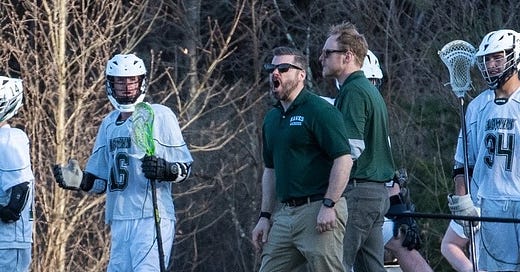Something happened this past Sunday. It was a thing that made me furious in the moment, in the hours afterward, and if I’m honest, even a few days later.
After coaching the U10 indoor team, I made my way through the handshake line only to reach the end and have the opposing coach close his (extremely yoked) hand over mine, squeeze it, and pull me toward the ground. I was so shocked that I froze, turned, then looked at my hand. One of the refs asked me what happened and I said, startled, “That guy just tried to pull me to the ground.”
It was one of those moments where everything slowed down, and all I could feel was blood rushing to my neck. Instead of calling after the guy or chasing after him, I left the turf and congratulated my goalie on a great game. Smiling and asking for “Knucks” as I seethed. I went through the crowd of players and said good job to all the boys I could see. The whole time, just holding in this heatwave of anger inside of me. I don’t remember the last time I’ve been that angry in lacrosse or any other facet of my life.
I made it to the bathroom and just stood there staring at the mirror for a few moments. Just trying to process it all before eventually leaving without any discourse.
Now, what I would like to do is blast that guy, the town, and the team into oblivion here in this newsletter.
But I’m not going to do that.
I want to talk to you about sportsmanship.
In my second year as a college head coach, my team won the sportsmanship award for the conference. I didn’t know we had won it until the plaque was delivered to my office the next fall. I showed it to everyone at the team meeting the next day.
And then I threw it in the garbage.
I said something like, “That is the loser award. They gave us that because they liked beating us and we took it on the chin. Well, I’m sick of getting patted on the head. I want to win. I don’t want to ever win this award again. Do you understand me?”
When everyone left, I went back to the locker room and fished the award out of the trash. I kept it in the bottom drawer of my desk until I left that job. I still have it today. It sits covered by books I haven’t read at the bottom of a shelf in my living room.
The next season, we played in a game that was going to end in a fight. Big hits weren’t called early and there were just bodies everywhere. The refs, the coaches - we weren’t going to be able to stop it. It was a runaway train.
So when the game ended, I took my team to the end line. I told my captains to walk with me to the handshake line and told everyone else to walk back through campus together and not say a word. There were some protests, then there was some colorful language to reinforce the order.
I walked back to the half line with my three captains to a stunned coach and team who called us every name in the book as we went through the line. I gritted my teeth. I finally got the head coach at the end of the line and he started screaming at me about sending my team away. I said, “It’s my job to keep to protect them, even if it’s from themselves. If they all stayed there would have been a huge fight. So I sent them to the locker room. It was my call, not theirs.”
“No! Not my guys! Maybe you should learn how to control your players!” he puffed his chest out and looked down at me darkly.
“You’re right.”
I turned and left. My captains said nothing, but I could tell they were angry with the situation - and me.
The next day I was called into the athletic director’s office and got a real reprimand. Like the kind where your stomach ties itself into knots but you have to pretend like you’re listening intently. I nodded. I didn’t argue. I just said, “It’s my job to protect them. And that was my decision in the moment. I don’t know if I would do it the same way again, but it’s what I felt needed to be done.”
I didn’t trust them. I didn’t trust myself.
I tell you those two stories to illustrate how wrong I was in both cases.
See - sportsmanship matters because sports is a microcosm of life. Sports teach you that if you work hard and put your heart and soul into everything and always show up and do everything right - you can still lose.
Sports also teach us that there is, usually, another game to be played. Another chance to win. Another opportunity.
Sports teach us to deal with loss as much as it teaches us to enjoy winning. It teaches us to comport ourselves and deal with our emotions.
The handshake line is a sacred place. it’s where you meet your opponent after playing the game to the best of your ability. Sometimes you win. Sometimes you lose.
But you always shake hands.
If you do anything untoward in a handshake line, at any level of play, you are a loser.
I don’t mean in terms of the game; I mean in your existence.
Because if you have no sportsmanship - you’ve learned nothing from sports.




Nice job KD
Truth. Good essay. Thanks.